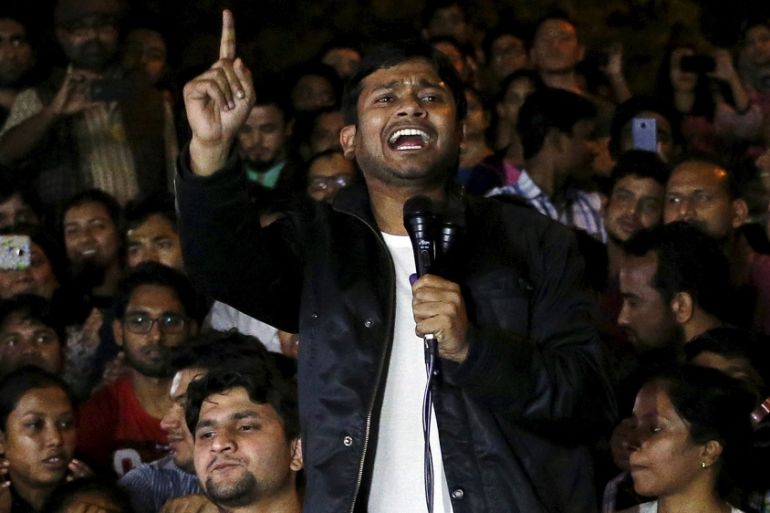Loud and clear, Indian students send message of freedom
Released from jail on bail, student leader Kanhaiya Kumar delivers impassioned speech about what freedom means in India.

New Delhi, India – Freedom cries are back in the embattled campus of Jawaharlal Nehru University (JNU), which has been at the centre of a nationalism debate after a few of its students were slapped with sedition charges.
Kanhaiya Kumar, head of JNU’s student union, was arrested last month for alleged sedition in a case that led to mass protests and accusations the government was trying to stifle free speech.
Keep reading
list of 4 itemsPalestinian Prisoner’s Day: How many are still in Israeli detention?
‘Mama we’re dying’: Only able to hear her kids in Gaza in their final days
Europe pledges to boost aid to Sudan on unwelcome war anniversary
On Thursday, after being released from prison on a six-month bail, he delivered an hour-long impassioned speech at the JNU campus laced with powerful sloganeering.
READ MORE: India student leader calls for freedom in moving speech
Kumar, who received a hero’s welcome by students and faculty members, seemed to have lost none of his lung power during his 20-day prison stay and a trial that also involved him being beaten up within the court’s premises.
In front of more than 4,000 people, he spoke at length about freedom, caste and class divide with an idealism that seemed to disarm his audience.
It was as if the students of JNU, supported by the teaching staff, had decided to teach their countrymen a few “lessons”:
1. Freedom ‘in’ and not ‘from’ India
While explaining the slogans shouted at the controversial event of February 9 – when students held a rally to mark the anniversary of the execution of a Kashmiri separatist – Kumar scoffed at those who argued for sedition charges to be brought against them.
He also took a dig at how the narrative of that fateful evening was misrepresented by sections of the media who devoted hours of prime time on telecasting videos, whose authenticity is now being questioned.
New Delhi protest: Thousands call for student’s freedom
Some news networks had even branded those arrested as “anti-nationals” and “terrorists” even before any official probe had begun.
Most Indian news channels, barring a few notable exceptions, carried Kumar’s speech live on Thursday night.
2. The difference between ‘political’ and ‘social’ democracy
During his speech, Kumar mounted a severe critique of the national government and its heavy-handed clampdown against students.
He said students in the campus have been fighting against the cuts in research fellowships by the Ministry of Human Resource and Development, arguing that they have now “reaped” what they “sowed: by criticising Minister Smriti Irani.
|
|
Kumar, who hails from a lower middle class family with a monthly income of under $50, said this was part of a larger struggle for students across India to get access to quality education.
He repeatedly invoked the name of Rohith Vemula, a Dalit (lowest in the Indian caste strata) student, who killed himself in January this year, after he was suspended from the Hyderabad university, in a case some have blamed on caste-related discrimination.
Kumar said that, in contrast to those who pay mere lip-service to the ideals of the Indian constitution, he and other JNU students had complete faith in the tenets of “samaanta” (equality), “samaajwaad” (socialism) and “dharm nirpekshta” (secularism) enshrined therein.
This, he said, was true “social democracy”.
3. Nationalism
A doctoral student at JNU, Kumar also tried to explain the difference between rallying against the state and rallying against the country.
He said when students in the campus shout slogans for “Azaadi” (freedom), they are urging for freedom against “bhookhmari” (hunger), “manuvaad” (the laws of Manu which laid down the strictures of caste system) and “jaativaad” (caste discrimination).
India’s caste system is perhaps the world’s longest surviving social hierarchy and any discussion around it evokes polarised responses.
On Thursday, Kumar also charged that the student group is being targeted over its ideological differences with the Hindu-nationalist umbrella group, the Rashtriya Swayamsevak Sangh (RSS), to which the ruling party owes its allegiance.
“The sons of farmers are dying in the fields as well as on the borders while some people are trying to create a false divide between the two,” he said.
The supporters of the ruling Bharatiya Janata Party have said the alleged “anti-national” slogans raised by students in the university in Delhi were an “insult” to Indian soldiers and martyrs.
4. Communication divide

In a candid admission of the failures of JNU and the larger community of the Indian intelligentsia, Kumar told the crowds that the discourse around most subjects of national concern was in a language that excluded the common citizen.
This, he stressed, was “unfair” and needed to change.
He emphasised how “publicity messaging” travels much faster with the aid of new technology ,while serious discussions remain within the fortresses of university walls.
Loud message
Through Kumar, JNU has delivered its message loud and clear.
The messengers have streamed it into every connected home – how it is going to be interpreted , however, remains to be seen.
But one thing is certainly clear.
Tthis is not the last chapter or the last lecture on the subject.